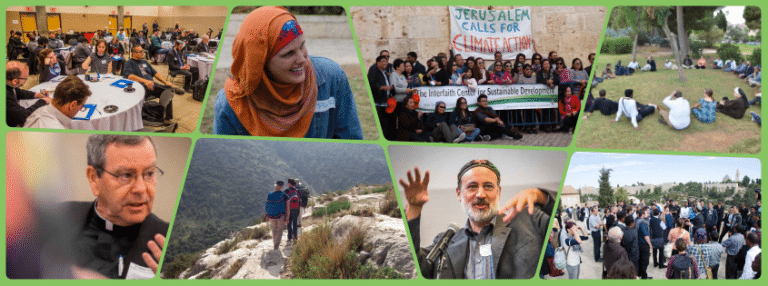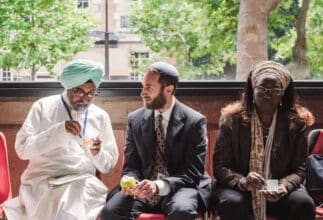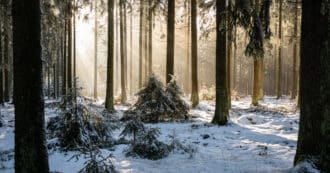By Anthony Bartaway for The Interfaith Center for Sustainable Development
On October 20th, 2013, a group of 44 Jordanian, Israeli, Palestinian, and American students from the Arava Institute for Environmental Studies attended an interfaith panel discussion on faith, ecology, and the Holy Land. The event was part of the Arava Institute’s Peace-Building & Environmental Leadership Seminar, a program dedicated to building bridges between different groups by focusing on environmental issues. The three panelists were Yasmin Barhum, landscape architect and facilitator at ‘Living in the Levant’, which aims to present Islam and the Arab population of Israel to non-Muslims through tours in the village of Ein Rafa and visits at the local mosque; Dr. Håkan Bengtsson, director of the Swedish Theological Institute in Jerusalem; and Rabbi Yonatan Neril, director of the Interfaith Center for Sustainable Development (ICSD). Liel Maghen of ICSD, and an alum of the Arava Institute for Environmental Studies, moderated the panel. The event took place on Mt. Zion at the Jerusalem Inter Cultural Center.
The panelists responded to questions about the role faith can play in environmental action and coexistence. Questions posed by the moderator included, “What do you see as the role of interfaith cooperation in promoting environmental solutions?” and “What do you see as the role of environmental issues in promoting interfaith cooperation?” The participants also asked a range of questions, including “What role does politics play in your work?” and “Do you encounter opposition to your work from members of your own faith community who do not share your views about the environment or interfaith outreach?”
According to its website, “The Peace-Building & Environmental Leadership Seminar builds on the conviction that the social and political relationships within and between groups in the region have a significant influence on environmental practices, public policies, and grassroots environmental activism.” Within the seminar, they aim to “create a microcosm of the region, building the tools and understanding necessary to foster justice, peace, and environmental sustainability in the broader society.” Including ICSD staff and guests, about 55 people attended the panel discussion: Jordanians, Israelis, Palestinians, and Americans, Christians, Muslims, and Jews. The event showed the promise and possibility of people of different nationalities, faiths, and ethnicities coming together to discuss and plan for a sustainable and shared future in the region.
Testimonial
Through the emphasis on inter-religious cooperation, I believe that the environment can also act as a bridge between people of different faiths and cultures, opening a much needed dialogue about our shared future on this planet that we all care for. The Interfaith Center for Sustainable Development not only emphasizes the need for action and local environmental projects, but it also considers this need for an open dialogue between people of different faiths and belief systems. There is a strong focus on where we can all agree on environmental values and goals, but it also creates a space for more controversial issues or fundamental conflicts to be addressed and worked through in a diplomatic way, enriching each person’s understanding of the other’s point of view. It’s a space to learn from one another, but it’s also rooted in a shared desire to create solutions for the environmental problems we all must face together. Taking part in this panel reaffirmed, for me, the fact that there is meaning in this relationship between religion and the environment not only on a larger community scale, but also personally for myself, on an individual level. It reminded me that my passions and interests are relevant to the world today, and that I should continue to learn and grow in my understanding of how religious leaders, environmentalists, scientists, and members of a community can and should find a common ground to discuss these issues and develop pathways to a shared sustainable future.
Vanessa Gikas






